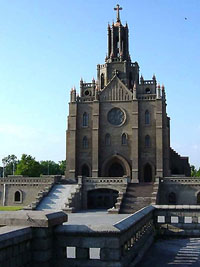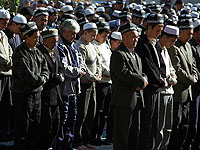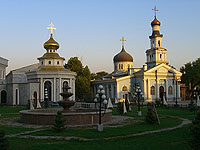 |
|
Uzbekistan - Religion |
||||
|
Over the space of many years, various religions existed in harmony and prospered on the territory of Central Asia. The religion regardless of one's nationality or race, has served a cultural basis that linked countries and continents. The Constitution of the Republic of Uzbekistan, adopted in 1992, states: "Freedom of conscience is guaranteed for everybody. Everybody has the right to believe in any religion of his or her choice or have no religious faith. Religious conviction is not imposed on anybody against his or her own will". Religion is separated from state and all the religious organizations are equally regarded. The state has no right to interfere in the activities of religious organizations. Since Uzbekistan gained its independence, the overall attitude towards religion has greatly changed. Within the framework of law, religious organizations have been granted free and open activity in the society. Uzbekistan is a secular state, the religious way of life and thinking lives in harmony with that of secular in the country. The Law of the Republic of Uzbekistan "On freedom of faith and religious organizations" of 1998 secures the right of public to profess any religion individually or in group, observe religious customs and rites, offer a pilgrimage to holy sites. Most of the population of Uzbekistan follows Sunni Islam. Besides, there are representatives of more than 15 religious confessions in the country. They are Catholics, Protestants, Jews, and others. All of them act for the sake of prosperity of Homeland, consolidation of national independence, as well as promotion of political and social stability. In 1991, for the first time the Holy Quran was translated into Uzbek language and published in Uzbekistan. It was reprinted in 2001. The same year the collection of akhadith (sayings, deeds, orders of the Prophet Muhammad) by Imam al-Bukhary, was published in four volumes. In 2002 about 4,000 people went on Hajj and another about 4,000 - Umra procedures. The Religious Council of Uzbekistan 's Muslims. It runs two religious high schools, the Mir Arab in Bukhara (est. 1945) and the Institute of Islam (est. 1971) in Tashkent, and about 2,00C mosques. For the first time the "Holy Quran" in the translation by Alouddin Mansur was published in 1991 at the The Council also has its weekly and monthly publications; Representatives of different religions have been living in harmony in Uzbekistan. Various events are organized to support mutual understanding among different confessions. For instance, in 1995 the Muslim-Christian conference entitled "Living together in harmony" was held in Tashkent. In 1996 the Russian Orthodox Church celebrated the 125th anniversary of its Eparchy in Central Asia. In the same year followers of the Evangelical-Lutheran confession celebrated the centenary of the Lutheran church in Uzbekistan. In 1999, the Catholic Church opened its Cathedral in Samarkand. During the years of independence, a number of international symposiums were held in Uzbekistan on the occasion of remarkable jubilees of renowned Muslim scholars. Religion in Azerbaijan, Georgia and Armenia |


